
12 Books Guaranteed to Make You Cry
(According to Us)
The Lit Hub staff: we’re just like you. We read books. We cry. Sometimes we cry while we read books. We were deeply upset after finishing A Little Life. We’re still not totally over it. And the worst part is: it’s not only A Little Life. So if you’re looking for a new book to tug at your heartstrings (and, more importantly, tear ducts), or just want to file away information on how to make us feel bad at a later date, please find below a selection of books that have made the Lit Hub staff cry—or, since not all of us are actually big criers, at least made us really, really sad.
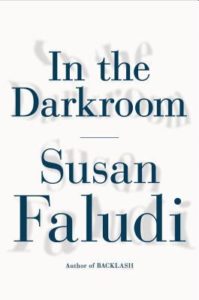 Susan Faludi, In the Darkroom
Susan Faludi, In the Darkroom
I have a short enough emotional fuse that a list of the last books that made me cry would likely be a list of whatever books I’d most recently read. In the interest of specificity, I’ll highlight a book that wrecked not only me, but also a friend I lent it to immediately after: I have the tear-stained selfie she sent me to prove it. Susan Faludi’s In the Darkroom, which won the 2016 Kirkus Prize for Nonfiction, is the kind of complex that resists quick summarization, but I’ll give it a shot: When she was a child, Faludi’s father Steven, a Hungarian immigrant and Holocaust survivor, was aggressive, preoccupied with masculinity, and ultimately violent. Her parents split when she was 16, and her mother obtained a restraining order against her father. Eventually, Steven repatriated to Hungary; when Faludi received an email from Steven in 2004, they hadn’t spoken 27 years. That wasn’t the only surprise—her father revealed that she had undergone gender reassignment surgery in Thailand and now went by Stefánie. Faludi flew to Budapest a few months later, and In the Darkroom is a chronicle of what ensued, a moving, enigmatic reckoning between Susan and Stefánie; between Stefánie and her past as Steven Faludi and, earlier, István Friedman; and between the trauma of the Holocaust and the trauma of gender dysphoria.
–Jess Bergman, Features Editor
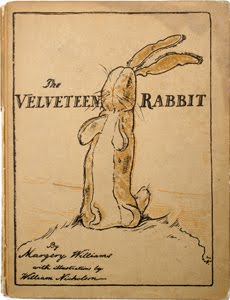
Margery Williams, The Velveteen Rabbit
I would be remiss to not include The Velveteen Rabbit on this list; I have worked myself into tears several times merely explaining the story of the Skin Horse, often to relative strangers. If you are unfamiliar: the abandoned Velveteen Rabbit encounters the Skin Horse in the nursery—the Skin Horse has lived there the longest, and he is all patchy and decrepit. He explains that this is because years ago, he was made Real through love. And once you are Real, even if you are alone and hairless and the person who loved you has long since forgotten you, you can never become unreal again. That really fucks me up. This very story inspired Jess and I to launch a reading series about crying in public entitled Whom Wants to Cry that will maybe, one day, return.
–Blair Beusman, Associate Editor
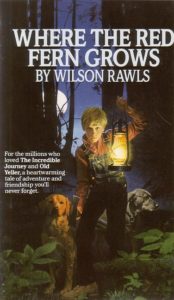 Wilson Rawls, Where the Red Fern Grows
Wilson Rawls, Where the Red Fern Grows
By the third grade, I was already a big reader (thanks Mom and Dad), and my teacher, seeing that my reading comprehension was above the level of the books we were reading in class, assigned me something extra: Where the Red Fern Grows. Well, as it turned out, my reading comprehension might have been beyond the third grade level, but my emotional comprehension was not. I cried so hard I fell out of my chair. In class. During quiet reading time. That seems like an overreaction now, but look: the one dog dies and then the other dog dies of sadness. Of sadness! I stand by the falling thing. This book is sadistic. I haven’t cried at a book since, so either this one cured me of the weepies or just destroyed my emotional nerve endings for life. Either way!
–Emily Temple, Senior Editor
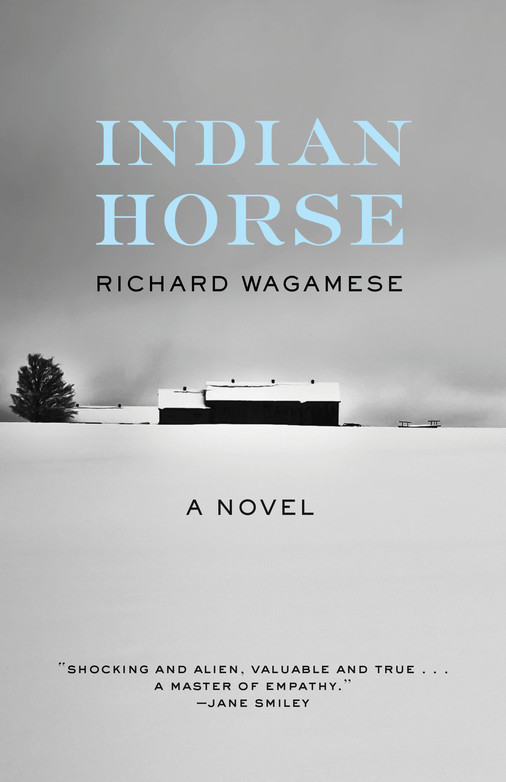
Richard Wagamese, Indian Horse
Like Jess Bergman above, I too, am quick to cry, so this was an easy assignment. I’ve already talked about how much I loved Indian Horse by the late Richard Wagamese (who was Ojibwe, from the Wabaseemoong Independent Nations), and though there’s no shortage in this slim novel of the starkly tragic—Indigenous Canadian children stolen from their families and placed in “Residential Schools,” cold, cruel places in which abuse was rampant and suicide common—it is Wagamese’s conjuring of the joy and kineticism of open-air hockey that brought me to tears: young men with little to hope for carving out a patch of frozen autonomy on the far-flung rinks of the northern prairie. (And if you don’t believe me, we’ll be running one such section this coming Monday, April 23).
–Jonny Diamond, Editor in Chief
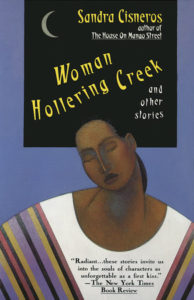 Sandra Cisneros, Woman Hollering Creek
Sandra Cisneros, Woman Hollering Creek
Lately whole books have been hard as I’ve been teaching and writing, but I have kept reading stories and poems. Two short stories turned on the waterworks lately. “Mexican Movies” by Sandra Cisneros ends with such a beautiful description of falling asleep at a movie theatre and being carried home. You read it and instantly become that age again, the transportable age, when you can fake being asleep. Finishing the story was like waking up and realizing I’d never be that age again. The entirety of Woman Hollering Creek operates like this, be forewarned—Cisneros dunks you so vividly into sensory experiences it feels like loss when you come out of them. The other story which had me reaching for the tissues was actually written by one of my students at NYU, Jerome Blanco. He has this pitch perfect story about a woman going home to Philippines as her mother is dying in a coma. In one scene, the woman starts to speak to her mother and he did it so well, I remembered what that felt like: to beg.
–John Freeman, Executive Editor
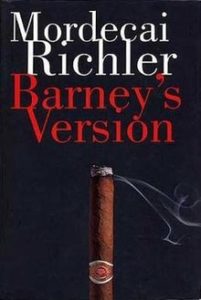 Mordecai Richler, Barney’s Version
Mordecai Richler, Barney’s Version
Barney’s Version by Mordecai Richler is not a sad book—the sardonic memoirs of Barney Panofsky are generally funny, if a little dark. But books that make you cry sometimes make you cry because of the circumstances when you read them. One of the winters I was in graduate school (of which there were several) I had moved back in with my parents and commuted uptown and then back to Brooklyn at strange, off-peak hours. An unreliable narrator was somehow perfect company. I finished the last pages of Barney’s Version a few minutes after I got off the train, standing in the middle of an empty station, enjoying a big fat cry for poor Barney, misunderstood misanthrope, unloved father, falsely accused.
–Emily Firetog, Managing Editor
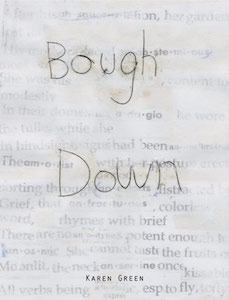
Bough Down, Karen Green
Bough Down is an absolutely heartbreaking and beautiful collection by Karen Green, who was married to David Foster Wallace, about the aftermath of his suicide. In it, she grapples with this devastating loss, feelings of guilt, and the strangeness of mourning very personally a beloved literary icon. This tension is distilled in my favorite poem from the collection, “At Least He” (which caused me to put the book down for a few days):
I want him pissed off at politicians, ill at ease, trying to manipulate me into doing favors for him I would do anyway. I want him looking for his glasses, trying not to come, doing the dumb verb of journaling, getting spinach caught between canine and gum, berating my logorrhea, or my not staying mum. I don’t want him at peace.
–Blair Beusman, Associate Editor
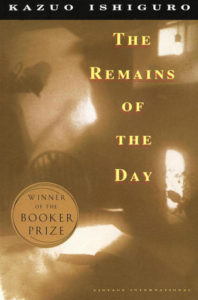 Kazuo Ishiguro, The Remains of the Day
Kazuo Ishiguro, The Remains of the Day
Because I’m dead inside, or perhaps doing books wrong, or both, I don’t think reading has ever moved me to weeping. However, I recently got around to reading the sorrowful masterpiece that is The Remains of the Day and let me tell you, if you’re a crier, this book will wreck your face with tears. Head Butler of Darlington Hall, Mr. Stevens, has spent his professional life in the service of Lord Darlington—a fool who thinks the rising Nazi party can be appeased and befriended if a group of select, blue-blooded aristocrats like himself is allowed to craft British foreign policy behind closed doors. Instead of opening his heart to housekeeper Ms. Kensington, Mr. Stevens doubles down on his misguided professionalism and turns his back on love, and a life beyond the martyrdom of service. Only years later, standing in the rain as Ms. Kensington disappears from his life for the last time, does Mr. Stevens allow himself the admission that inside, his heart is breaking. I was talking about odd, literary Halloween costumes with a friend a few weeks back and he suggested that the most terrifying costume of all might be that of Mr. Stevens’ Regret. Tell that person you love them, guys. Do it now before you too must don this haunted, rain-soaked garb . . . forever.
–Dan Sheehan, Book Marks Editor
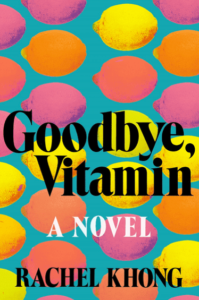 Rachel Khong, Goodbye, Vitamin
Rachel Khong, Goodbye, Vitamin
In her semi-autobiographical story “Project for a Trip to China,” Susan Sontag, whose father died abroad when she was very young, writes, “I still weep in any movie with a scene in which a father returns home after a long desperate absence, at the moment when he hugs his child.” Loath as I am to compare myself to Sontag in any way, I share a similar, even broader weakness: a homecoming of any kind between fathers and daughters will make me cry, occasionally against my better judgment (I’m looking at you, Interstellar). In Goodbye, Vitamin, a daughter, Ruth, moves back in with her parents after a devastating breakup and the news that her father has begun displaying signs of memory loss. I read the novel in a single hysterical sitting, crying intermittently throughout but never so hard as during the sections told in the form of a journal Ruth’s father kept when she was very young. One particularly tender entry has stayed with me, and more likely than not reduce will to me tears again now as I attempt to reproduce it:
Today, after I took my socks off, you touched my ankles—the impression that had been left.
Today you put my hand on the impression left by your sock. My hand could circle your whole miniature ankle.
–Jess Bergman, Features Editor
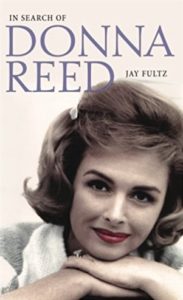 Jay Fultz, In Search of Donna Reed (in theory)
Jay Fultz, In Search of Donna Reed (in theory)
Without trying to sound boastful (it’s just the usual Boston Irish reserve, nothing special), I can honestly say I don’t remember ever crying, though annually I come close watching It’s a Wonderful Life, in particular the scene at the end when Mary comes into the crowded house with the sack full of money, looking pleased. So if I were to cry reading a book, logic suggests it would be a book like In Search of Donna Reed, by Jay Fultz, the only biography of Donna Reed I could find in ten minutes of Googling, which also led me to a 2009 New York Times article about the correspondence Reed kept up with young soldiers serving in WWII, including a B-29 gunner who’d asked her to dance at a USO canteen in 1943. In that article there was a picture of Reed at what appears to be a USO canteen, trying food off a soldier’s plate, looking almost exactly like she did coming into the house in Bedford Falls with that sack of money she’d begged off her friends and neighbors. Jesus, I gotta step outta the room a minute, grab a beer or something, my eyes are itching, must be the goddamn allergies this time of year, what the hell are you looking at?
–Dwyer Murphy, Crime Reads Senior Editor
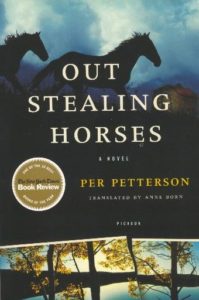 Per Petterson, Out Stealing Horses
Per Petterson, Out Stealing Horses
At 67, Trond Sander is settling into a life of quiet solitude in the forests of Norway. While the premise seems peaceful enough, Trond’s retirement is riddled with melancholy. The first few chapters in the book deliver blow after blow: a neighbor recounts the time he had to shoot his dog, Trond has a childhood memory of his friend Jon showing him a bird’s next only to crush the eggs, that same friend lost a younger brother. After Jon leaves a loaded gun in the house, his twin brothers begin playing with it, resulting in a shot to his twin’s head. There’s a tension between the evil and innocent, something that only continues to grow as Trond unearths dark childhood memories. But Trond’s present day is equally somber. As the story continues, his true reason for isolation is revealed: within one week he lost his sister to cancer and his wife to a fatal car crash. This harrowing story left me feeling weighed down for weeks.
–Alicia Kroell, Editorial Fellow
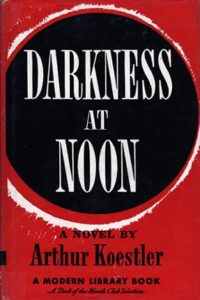 Arthur Koestler, Darkness at Noon
Arthur Koestler, Darkness at Noon
I don’t consider a book to have made a significant impression on me unless it makes me cry (I’m an emotional junkie, what can I say?) so I’m going to put down the book that’s made me cry the most times: Darkness at Noon, by Arthur Koestler. After narrowly escaping Stalinist purges, Koestler wrote this book against the backdrop of the show trials of the 1930s, wherein many of the most powerful figures of the Russian Revolution were tortured into falsely confessing to sabotage and other crimes against the Soviet state as Stalin brutally consolidated his power. Koestler wondered at how these Old Bolsheviks, so renowned for their commitment to principal, could have been convinced to falsely confess to crimes they did not commit. Beyond torture—which many of the men on trial had previously endured in their revolutionary youth—Koestler wanted to portray how someone could be convinced that the best thing for the Soviet state would be for them to confess, and Darkness at Noon shares the same horrifying mental gymnastics on the part of the imprisoned as 1984.
Maybe the reason I’ve cried so many times after finishing this book, yet continue to return to it, is that it’s a narrative of extreme disappointment—a warning against utopians like me. At the same time, it’s a defense of that same utopianism—it’s the realities of Stalinism, not communism, that have caused the figures in this book to behave the way they do. Or maybe I feel so sad after finishing this book because everyone in this story is trying so hard, and making so many compromises, that it’s able to reflect the human side of historical monstrosity in a way that few works achieve. One of the saddest characters to fill the pages of this very sad work is a revolutionary who is released from prison under the Tsar, only to be soon enough re-imprisoned under Stalin. He maintains his cheer by refusing to believe the revolution has happened at all. The protagonist has a more grim outlook—the revolution has disappointed him, but he has also dissapointed his version of the revolution, allowing his lover to be arrested without protest, and abandoning vulnerable German communists to their fate under the Nazis. For those who think Graham Greene’s Catholic novels have the monopoly on quietly expressed guilt, Darkness at Noon will quickly prove them wrong. Also, if you’re still not crying by the end of this book, look up Arthur Koestler’s biography. Adding to the tragedy of his early life, Arthur Koestler had a bizarre life as an assisted suicide activist post-WWII and ended up committing double suicide with his wife as an act of protest.
–Molly Odintz, Crime Reads Associate Editor



















